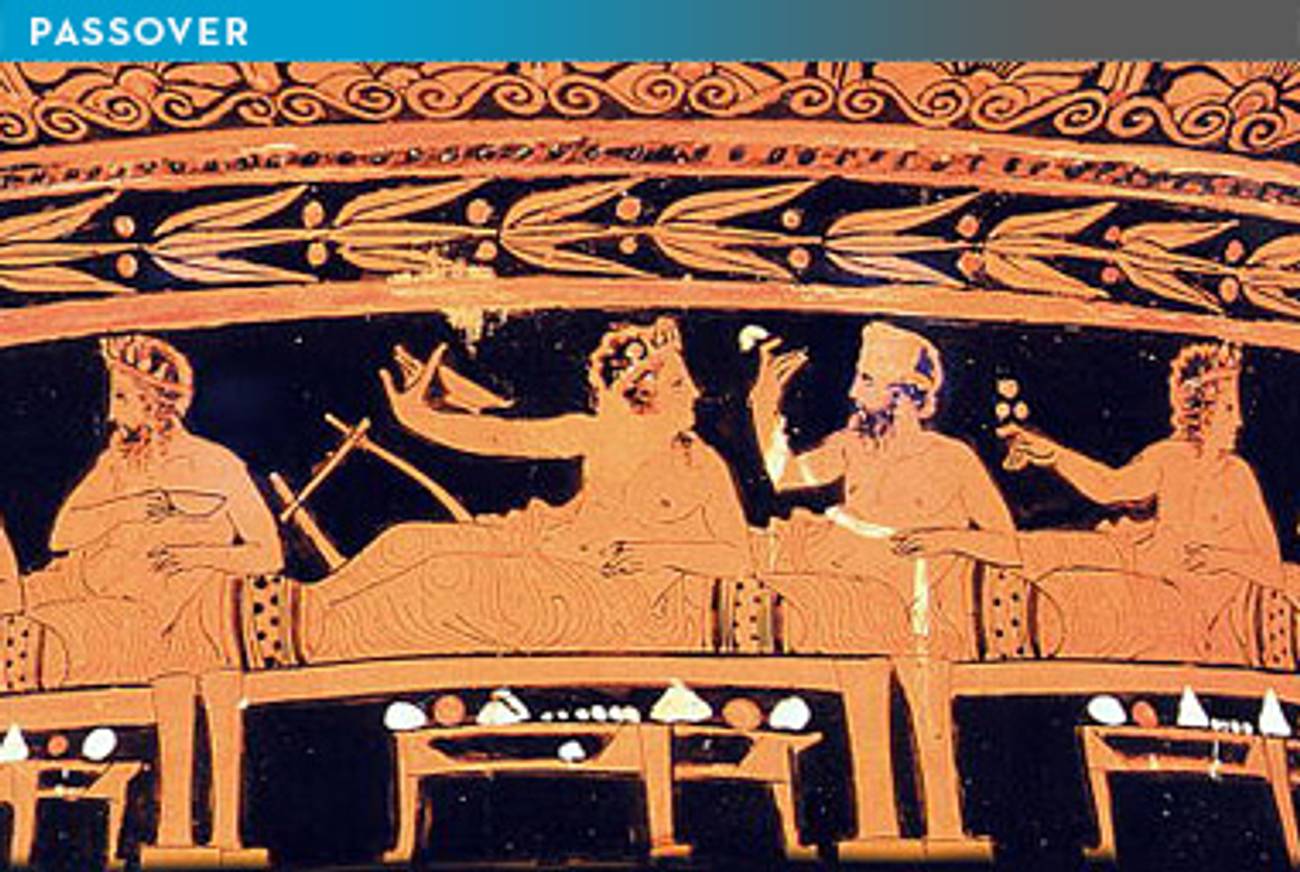Platonic Form
What makes the seder night different? Its Greek roots.




Seders are weird. I am reminded of that every Passover when I watch the non-Jewish guests flip through the haggadah in polite disbelief. “What are we doing here?” the youngest child ritually inquires. “We’re telling the story of the Exodus!” we ritually reply. But we aren’t. We’re saying blessings, talking about food, drinking glass after glass of wine, singing what sound suspiciously like drinking songs, and playing children’s games. The one time we’re supposed to be telling a story to our children—during the maggid—we’re actually explicating bits of text in the whimsical fashion beloved of the ancient rabbis, rather than recounting the details of the flight from Egypt. No child or outsider will ever learn the flow of the Exodus narrative from a seder.
Ah, but Judaism’s like that, we say with pride. Labyrinths of text. Allusions to allusions. You can’t just blunder in. You have to master the rules of Jewish rhetoric. But the haggadah is weird even by Jewish standards. What other liturgical text instructs us to recline like aristocrats and discuss at length the fine points of flat bread, parsley, and eggs? What other service requires us to drink to excess and eat a sandwich for an appetizer?
There’s a reason the haggadah feels goyish: Formally speaking, it’s Greek. It’s a Judaicized version of a Greek genre called “symposium literature.” You’ve read other examples in philosophy class. Plato loved the form. So did his fellow student of Socrates, Xenophon. The symposium enshrined the most appealing traits of the Hellenic personality: conviviality, Epicureanism, a love of good conversation.
Symposia came in many flavors. Some featured communal singing; some began with prayer. But all revolved around table talk, freewheeling discussions of everything from the origins of the world to the peculiarities of different kinds of fish, meat, and vegetables. These conversations were recorded (or made up), says the Greek historian Plutarch, to further “a deeper insight into those points that were debated at table.” For, he continued, “the remembrance of those pleasures which arise from meat and drink is ungenteel and short-lived … but the subjects of philosophical queries and discussions remain always fresh after they have been imparted.”
Nowadays, Jewish scholars deny that the haggadah comes from symposium literature. Symposia, they say, were likely to degenerate into bacchanalias; seders are comparatively sober. Ancient Jews ate communal meals too; they didn’t need to model theirs after the Greeks’. Besides, we know why the rabbis came up with the seder. They needed to reinvent Judaism after the destruction of the Temple. We have seders because we can’t offer the sacrifice of the paschal lamb.
All this may be true without diminishing the likelihood that the rabbis took from the symposium the components that make the seder different from all other Jewish festive meals, namely, the instruction to talk and a mandate to do what it takes to get a good conversation going. And what does it take? Two things: first, the egalitarian ethos of the dinner table, rather than the hierarchical etiquette of the yeshiva or the synagogue. As Plutarch pointed out about the symposium, “Questions should be easy, the problems known, the interrogations plain and familiar, so that they may neither vex the unlearned nor frighten them from the disquisition.” And second, a relatively rare (for the rabbis) spirit of indulgence. As the rabbis themselves put it: On Passover, “it is a commandment to please one’s children and the members of one’s household … with wine. Rabbi Yehudah says, [please] women with what is befitting them and children with what is befitting them.”
So, this Passover, be sure to drain your glass before you pour the next one; pass the nuts and candy; and let no conversation die before its time, lest you violate both the spirit and the law of the seder.
This essay is to appear in Jonathan Safran Foer’s The Unfolding Haggadah, which is scheduled to be published by Little, Brown next year.
Judith Shulevitz is a contributing editor to Tablet Magazine and the author or the newly published The Sabbath World: Glimpses of a Different Order of Time.